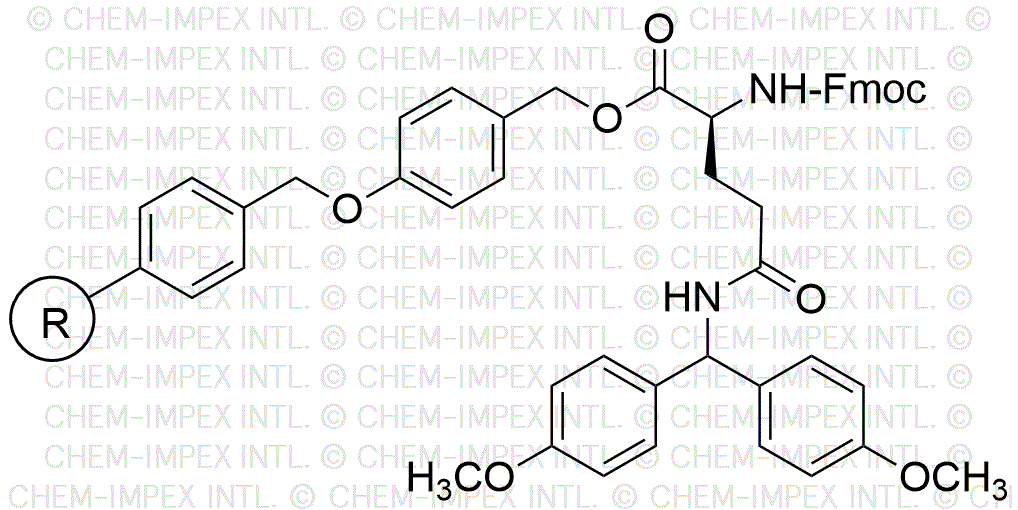Na-Fmoc-Nd-4,4'-dimethoxybenzhydryl-L-glutamine 4-alkoxybenzyl alcohol resin is widely utilized in research focused on:
- Peptide Synthesis: This resin is essential for solid-phase peptide synthesis, allowing researchers to efficiently create complex peptides with high purity and yield.
- Drug Development: It plays a crucial role in the pharmaceutical industry for developing peptide-based drugs, enabling the exploration of new therapeutic options.
- Bioconjugation: The resin is used in bioconjugation processes, facilitating the attachment of peptides to other molecules, enhancing drug delivery systems.
- Protein Engineering: Researchers utilize this resin in protein engineering to modify proteins for better functionality, stability, or targeting capabilities.
- Academic Research: It serves as a valuable tool in academic laboratories for studying protein interactions and functions, contributing to advancements in biochemistry and molecular biology.
Informations générales
Propriétés
Sécurité et réglementation
Applications
Na-Fmoc-Nd-4,4'-dimethoxybenzhydryl-L-glutamine 4-alkoxybenzyl alcohol resin is widely utilized in research focused on:
- Peptide Synthesis: This resin is essential for solid-phase peptide synthesis, allowing researchers to efficiently create complex peptides with high purity and yield.
- Drug Development: It plays a crucial role in the pharmaceutical industry for developing peptide-based drugs, enabling the exploration of new therapeutic options.
- Bioconjugation: The resin is used in bioconjugation processes, facilitating the attachment of peptides to other molecules, enhancing drug delivery systems.
- Protein Engineering: Researchers utilize this resin in protein engineering to modify proteins for better functionality, stability, or targeting capabilities.
- Academic Research: It serves as a valuable tool in academic laboratories for studying protein interactions and functions, contributing to advancements in biochemistry and molecular biology.
Documents
Fiches de données de sécurité (FDS)
La FDS fournit des informations de sécurité complètes sur la manipulation, le stockage et l’élimination du produit.
Spécifications du produit (PS)
Le PS fournit une description complète des propriétés du produit, notamment sa composition chimique, son état physique, sa pureté et les exigences de stockage. Il détaille également les plages de qualité acceptables et les applications prévues du produit.
Certificats d'analyse (COA)
Recherchez des certificats d'analyse (COA) en saisissant le numéro de lot du produit. Les numéros de lot et de lot se trouvent sur l'étiquette d'un produit, après les mots « Lot » ou « Lot de fabrication ».
Numéro de catalogue
Numéro de lot/série
Certificats d'origine (COO)
Ce certificat d'exploitation confirme le pays dans lequel le produit a été fabriqué, et détaille également les matériaux et composants utilisés et s'il est issu de sources naturelles, synthétiques ou autres sources spécifiques. Ce certificat peut être requis pour les douanes, le commerce et la conformité réglementaire.
Numéro de catalogue
Numéro de lot/série
Fiches de données de sécurité (FDS)
La FDS fournit des informations de sécurité complètes sur la manipulation, le stockage et l’élimination du produit.
DownloadSpécifications du produit (PS)
Le PS fournit une description complète des propriétés du produit, notamment sa composition chimique, son état physique, sa pureté et les exigences de stockage. Il détaille également les plages de qualité acceptables et les applications prévues du produit.
DownloadCertificats d'analyse (COA)
Recherchez des certificats d'analyse (COA) en saisissant le numéro de lot du produit. Les numéros de lot et de lot se trouvent sur l'étiquette d'un produit, après les mots « Lot » ou « Lot de fabrication ».
Numéro de catalogue
Numéro de lot/série
Certificats d'origine (COO)
Ce certificat d'exploitation confirme le pays dans lequel le produit a été fabriqué, et détaille également les matériaux et composants utilisés et s'il est issu de sources naturelles, synthétiques ou autres sources spécifiques. Ce certificat peut être requis pour les douanes, le commerce et la conformité réglementaire.


